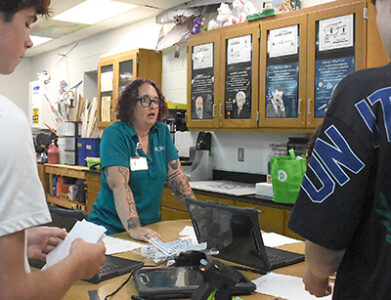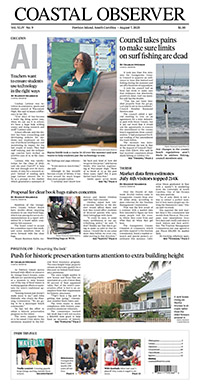Education
Teachers want to ensure students use AI in the right ways

Lindsay Latimer was involved in academics, sports and student council at Waccamaw High. She said AI made a difference in her life.
“Ever since AI has become a really big thing senior year, when we can use it in school, it’s been a huge help writing essays and doing research and stuff,” Latimer said.
School officials said the district has been researching and developing policies for students and employees on the use of artificial intelligence and monitoring its impact for the last couple of years. They had staff training, and the technology coaches have worked on positive uses of AI in the classroom.
Latimer, who was valedictorian for the Class of 2025, said she used ChatGPT to help her sort through over 50 documents of data for a research report. Instead of reading each page Latimer entered the title as a prompt to the chatbot which generated a summary of key findings and page references.
“It just saves so much time,” she said.
Although AI has recently become a topic of debate, it has been around for much longer than most people realize.
“I certainly don’t know how far back and, kind of, how did we get to this point,” said Rayna Smith, who teaches engineering at Waccamaw High. “Most of us think of AI as the past three years, right? But it goes farther back than that.”
Smith spent seven weeks this summer learning about the history, ethics and coding of large language models, a type of AI which is a driving force for applications for chatbots including ChatGPT. She was one of 10 teachers in the state who applied and were accepted to attend Research Experience for Teachers AI trainings through ADAPT. The ADAPT project, led by Clemson University in partnership with other universities, was made to advance AI and create biomedical devices to improve healthcare.
“This experience that I got to be a part of was just really eye-opening. It just made me look at AI in a much more positive aspect than a lot of teachers are looking at it right now,” she said.
Rodney Goodman, a professor and an expert in AI at the College of Charleston, led a session with the trainees about its history. Smith was surprised to learn that the development of AI began even before the creation of computers and the internet.
In resources provided to the trainees, Goodman said AI’s foundation dates back to the creation of the Turing Test in 1950, used to determine’s a machine’s ability to demonstrate human behavior, and Boolean algebra in 1854, a fundamental use of terms such as “and,” “or” and “not” in computing to search databases.
“I thought artificial intelligence meant computers, and it didn’t. It just means something learning that isn’t human, essentially,” she said.
Smith wants her students to realize that their understanding of AI and coding could lead to the creation of systems that could one day diagnose patients. She learned about prompt engineering, which explains how to properly use language to get a desired answer from chatbots. Her goal this school year is for her students to use AI “better” by relaying that information to them.
“I’m hoping that when I go through that, it’ll kind of spark some student to be like, ‘huh, maybe that’s something I want to look at a little bit more,’” Smith said.
Some teachers at Waccamaw High are compensating for the lack of district policy by implementing rules regarding AI usage in their class syllabi. Smith’s syllabus states that a student will receive a zero on an assignment if they use AI to “complete the work.” However she said they’re allowed to use it for brainstorming purposes.
“Once you get to know these kids, you can tell what’s theirs and what’s not. It almost becomes completely obvious,” she said.
This week Smith’s students were tasked with designing and building an expandable tool that can reach an egg from a minimum of 10 inches away using only provided materials such as rubber bands, string, cardboard and wooden tongue depressors.
Grant Swift, a junior in Smith’s second block class, said this is the type of project that doesn’t require AI.
“This is pretty easy. We’re just gluing sticks together,” Grant said.
He said AI is a good way to help with research and explaining instructions but not for assignments such as writing essays. Students in Smith’s class said most chatbots are blocked within the servers of the school district except for Ecosia Chat. Sawyer Brooks, a junior, said Ecosia is helpful in finding reliable sources and public domain images for presentation assignments in his courses.
Vinny Cegledy, a senior, said he uses AI at home as a convenience when he doesn’t understand a topic in the classroom, such as AP calculus.
“With four APs this semester and two paces on top of a sport, you get a little behind sometimes and need some extra help,” he said.
With football practice after school, he said staying after class isn’t an option.
Although it’s helpful for research purposes, Grant said he can’t rely on it, and the other students agreed.
“You can’t make it do your work,” Sawyer said.
“Yeah because then you’ll never learn,” Vinny added.
Alan Walters said there were conversations about AI usage when he served as the chair of the State Board of Education in 2022. To Walters, AI reminds him of when calculators were introduced into math classes.
“The concerns are still the same,” he said.
Walters said he hasn’t decided how he feels about AI but the supervision and ethics concern him, and he said he can’t keep up with it.
“It’s evolving so quickly,” he said.
“We’re all trying to figure it out,” Smith added.
The state’s Department of Education created AI standards framework on the impact of computing including the benefits, risks and ethics of its usage. Its main takeaways are to teach students the computing systems, data and analytics, algorithms and programming, impacts of computing and security and privacy.
Smith and each of the nine other teachers chose a standard to design a lesson based off of it as a part of their training. The teachers then shared their lesson plans with each other that could ultimately be passed to others.
“It was really neat to get to collaborate with other teachers across the state,” she said, “to get to hear, kind of, their struggles and their concerns and how they’re dealing with it.”
A benefit to using AI would be personalized learning, Walters said.
“I was always under the impression we went there to learn,” School Board Member Jarrod Ownbey said during his campaign for the District 6 seat. “There are parts of it that can be helpful. But let’s be honest, kids aren’t going to be using it for that.”
Paul Davidson, a sophomore, doesn’t use AI because he doesn’t trust it, he said.
“I like actual education, and AI’s not going to do that for you,” Paul said.
“It can be a good tool,” Smith added. “It can also be a definite way to just cheat your way through anything.”
Her philosophy regarding AI is that as more students use it, the more it will discourage cheating in class.
The middle and high schools in the district use Story of America, a free and supplemental resource, for students to learn U.S. history, according to Lindsay Weirich, the district’s social studies curriculum coach. Weirich is reviewing its AI feature called “History Court” where students can interact with historical figures as a judge to understand their perspectives at the time.
For example, Weirich was faced by Samuel Adams and a Quaker who both shared contrasting perspectives about going into the American Revolutionary War.
“AI generated their responses and their faces were moving as they were speaking,” Weirich said.
At the end of the AI court hearing, students give their verdict on who won the debate and why. Weirich said it’s graded based on a student’s historical thinking, understanding of context and questioning ability.
“I’m interested in looking more into it as another resource for Georgetown County,” she said.
Smith said AI’s prevalence has opened up discussions with other high school teachers at Waccamaw on how to incorporate it as a tool in the classroom rather than “pretending it doesn’t exist.”
“I don’t have any fear. I don’t see it as a replacement for education or an educator,” Smith said. “I think the more you gain an understanding of it, you could realize it’s not necessarily something to fear.”




